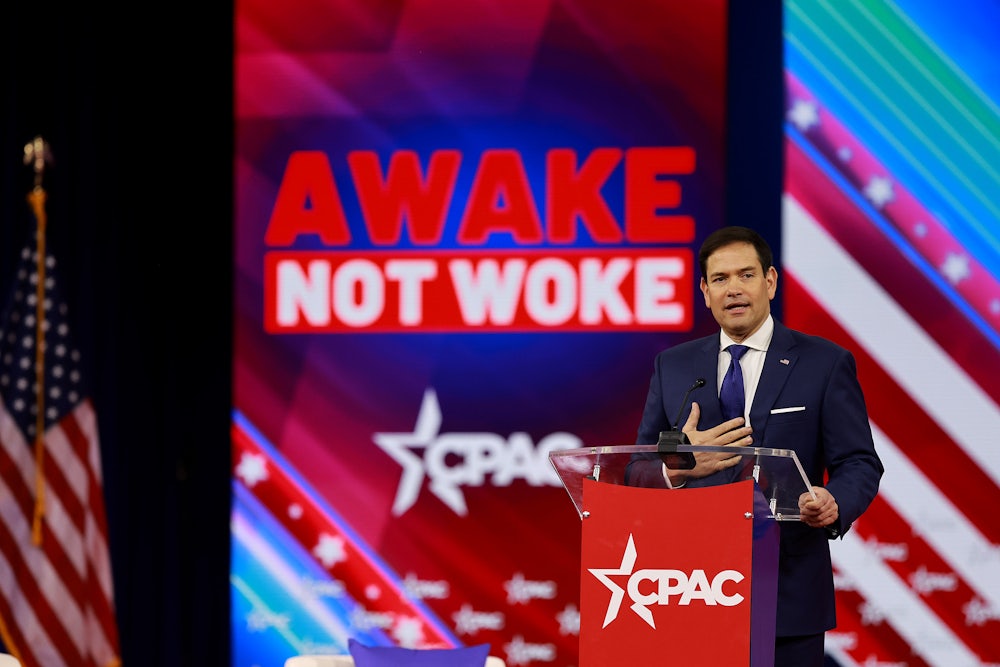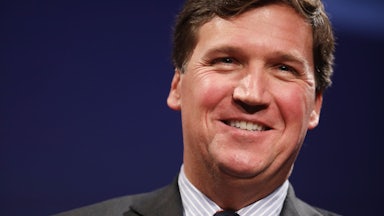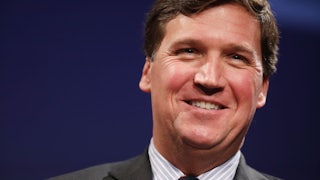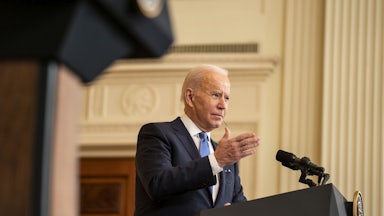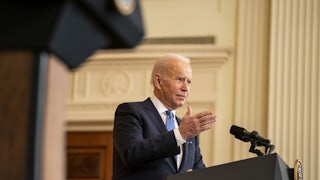It is Thursday, February 24, and we are in the enormous Gatlin Ballroom at the Rosen Shingle Creek hotel—an endless, rambling, palatial complex of chandeliers and windows and pools and palm trees. A crane-mounted camera swoops to capture the enormous crowd, standing in rapt attention as the soaring vocals envelop it in their familiar embrace. The Conservative Political Action Conference, the annual confab of conservative luminaries more commonly known as CPAC, is getting underway in Orlando, Florida, as it always does, with the national anthem.
The American Conservative Union, the hosts and organizers of the event, obviously learned the lesson of the disastrous live anthem performance at CPAC 2021. This year, the anthem is prerecorded. Every note is perfect. Things are going according to plan.
And yet, as the anthem reaches its crescendo—the rockets and the bombs—my mind is anywhere but in this room. I am thinking of my sleepless eyes transfixed, along with the rest of the nation’s, on the horrific videos emerging from Ukraine. We watched as the hell of European war waged by a superpower for the purpose of territorial expansion descended upon us in fire and fury. Most of us have no living memory of such a thing. To the end, I was sure it would not happen. And yet all of us now live in a world in which Russia has unhinged its jaw to swallow its neighbor.
And so, with only a few hours separating the unthinkable and the opening ceremonies of CPAC, the conservative wing of the Republican Party must scramble to develop a position in real time in front of a live audience.
It will not be the first time the conference opened with the conservative movement in such awkward arrears. CPAC 2021 took place in the shadow of January 6, and the air crackled with panic and uncertainty. At that time, the Republican Party’s future was far from certain; the precarity and tension were palpable. Mitch McConnell and Lindsey Graham had broken ranks with Trump. CPAC listed Mike Pence as the keynote speaker of the Ronald Reagan dinner. Trump himself was not slated to attend until mere days before the event. This was a party in the midst of an existential crisis. Two roads diverged in a blood-red wood and, live on stage at CPAC 2021, the American conservative movement chose the road less traveled, at least in the United States: conspiracy, vengeance, and a dangerous undermining of America’s long history of peaceful transition of power. The Democrats are not merely the opposition but an enemy to be crushed.
Whatever doubts may have existed in the conservative mind have since been wiped away. The 2022 crowd may be awkwardly stumbling to make sense of Ukraine, but they’ve resolved their own crises with a remarkable self-assurance. No one seriously doubted that Trump would take the keynote slot at the conference. Election fraud is no longer a fraught third rail but party dogma; the so-called “Big Lie” is questioned only in whispers. January 6, 2021, is no longer the elephant in the room—only one speaker directly addressed the incident last year—but the subject of entire speeches devoted to accusations fingering the FBI as the real culprit behind the Capitol riot and exhortations against the inhumane treatment experienced by arrested participants—in the genuinely horrific carceral system attendees tend to champion for everyone else. The conservative cup runneth over with the gifts of runaway inflation, Covid fatigue, and the inevitable, humiliating end of the decades-long Afghanistan debacle. The midterms promise to be a bloodbath. The party painstakingly forged unity from chaos.
And now Putin has invaded Ukraine.
Trump, infamously cozy with Russia, praised Putin’s strength and moxy just two days before the invasion began. More significantly, he tapped into America’s war fatigue to transform the GOP from the party of American interventionism into the party of American noninterference. China now firmly occupies the position of Republican bugbear. It seems unlikely that Russia could possibly displace it.
And yet how can the self-declared party of freedom face itself in the mirror if it encourages an enormous authoritarian juggernaut in its invasion of a sovereign nation currently fighting for its life?
The only truly safe position a conservative can take is that this is entirely Biden’s fault, and the first speaker of the day—conservative radio host Ben Ferguson—took this tack immediately. Two years ago, Biden tweeted that Putin does not want him to be president because “I’m the only person in this field who’s ever gone toe-to-toe with him.”
“How’s that working out for you?” Ferguson asks to raucous applause.
But this wan effort to paper over the Putin-lionizing in which many conservatives indulged in the run-up to the invasion is a far cry from a policy position, and 20 minutes later, ACU senior fellow K.T. McFarland took the stage in an unscheduled appearance to try to weave this horrific development into the existing party line. CPAC speakers had planned to hammer Biden on inflation, and so McFarland told the crowd that skyrocketing oil prices under the Biden administration gave Putin the money he needed to launch his invasion. After years of framing China as America’s nemesis, she argued that the recent China-Russia pact has restored “the China-Soviet alliance [that] has bedeviled the free world.”
But McFarland also deployed anti-Russian rhetoric not heard on a CPAC stage in many years. She framed Putin’s aggression as part of a “generational struggle not just about Europe,” asserted that the Russian dictator would continue to gobble up territory, and assured attendees that Putin’s endgame was the dissolution of NATO. Though she did not overtly call for military action, she emphasized the importance of standing with our allies.
McFarland ended with a bizarre attempt at tying these international events to what was supposed to be Thursday morning’s conference theme: the value of local political action. Washington has failed us, she says. “The answers are going to come from the people of this country rising up in a grassroots movement.”
The crowd sat silent for her entire speech. As she finished, they applauded obediently, but there was no joy in it.
Minutes later, a very different cohort of conservatives took center stage: political strategist and January 6 arrestee Alex Bruesewitz, Ryan Fournier of Students for Trump, and Instagram influencer Rogan O’Handley. They had arrived to talk about social media strategy, and they did so with gusto. “The left can’t meme,” they announced. The audience latched onto the change in mood, laughing along as the trio described leftists as ugly and devoid of humor. Some pulled out their phones to follow suggested Instagram accounts.
But at the very end, meme-war veteran O’Handley veered off-script to deliver the MAGA rebuttal to McFarland’s carefully crafted establishment position. “With all this Ukraine stuff going on, I’m sure there’s going to be a lot of establishment military-industrial-complex GOP people up on stage saying it’s in our national interest to fight our war,” he says. “It is not! Burisma! Hunter Biden was taking money.” The Biden dirty dealings in Ukraine, he claims, explain an imagined liberal drive toward boots on the ground in Ukraine. “We should not send our American sons and daughters to cover up the Biden crime family corruption!”
The crowd cheered wildly as the music played off the stage. This was the Ukraine take they were hoping to hear, and it was perfectly fitting that a self-styled meme lord would be the one to deliver it. Trump’s party is not the party of senior fellows or ancient Cold War history. It is a party grown fanatical and plump from tales of Hunter’s laptop, deep-state transgressions, and the sinister machinations of globalists. It is also a party sick to death of grinding wars to save democracy that result in humiliation and lost lives. There is no room in this worldview for an expansionist Russia.
An hour later, Charlie Kirk of Turning Point USA wove the anti-interventionist position into yet another Republican mainstay—illegal immigration at the Southern border. “I’m more worried about how the cartels are deliberately trying to infiltrate our country than a dispute 5,000 miles away,” he declared. “When your own country is falling apart, I don’t want to hear lectures about why we need to send OUR troops halfway across the world.” The crowd liked this position even better than the Hunter Biden angle.
I was suddenly transported back to August 2021, when Trump spoke to a rapturous crowd of screaming fans in Cullman, Alabama. I remember his face when cheers transitioned seamlessly into boos after he urged the audience to get the vaccine.
K.T. McFarland said the people would provide the answer. It turns out that she was correct, though perhaps not in the way she intended. When your power comes from the people, you’d better give the people what they want, lest you find yourself replaced. McFarland’s people do not want talk of “standing by allies.” They have no appetite for anti-Russian aggression. For years now, Putin’s place in Republican lore has been that of a cudgel wielded by the American left to impugn and impeach their beloved leader. Opposition to Russia reeks of Nancy Pelosi and Hillary Clinton. It is a bridge too far.
The cheers decided it. At 1:21 p.m., Tennessee Senator Marsha Blackburn tweeted: “Putin is a tyrant who must be stopped.” Approximately 10 minutes later she climbed onto the CPAC stage, urged people to pray for Ukraine, then moved immediately onto the safe ground of crack pipes and critical race theory. Perhaps someone told her to keep her mouth shut. Perhaps she decided it was the prudent thing to do. Either way, she stood mute on the matter of Ukraine.
An hour and a half later, Utah Attorney General Sean Reyes echoed Kirk: “This invasion [on our Southern border] is even more dangerous than the invasion that’s going on right now on the other side of the world.”
Josh Hawley had the last word on Thursday, and he hit on the first proactive solution that resonated with this war-weary crowd. With McFarland having already made the claim that skyrocketing oil prices financed Putin’s war, Hawley wrought an elegant and logical solution, knitting together the crowd’s restless desire for something MAGA-centric with the establishment cant they’d rejected in real time: Drill, baby, drill. “Show some strength to the world. Open up American energy production full throttle!” Hawley exhorted the crowd, to riotous applause. When he announced that he will introduce legislation on Monday to remove restrictions on energy production, he received a standing ovation.
It is the ultimate solution, perfect for the conservative worldview in every way. The economy is faltering? Oil jobs can fix it. Russia supplies the world with oil? America can take their place. Losing the military industrial complex? Secure the loyalty of old friends. Add in the inevitable liberal tears over the consequences of climate change, and you get pure conservative catnip. CPAC adjourned for the evening in high spirits—certainty had returned.
By Friday morning, talk of interventionism was verboten. Marco Rubio spoke at length about the horrors that emerge each hour from the war zone of Ukraine, praising the spirit of the Ukrainian people who are fighting and dying for freedom and liberty. For decades, such rhetoric inevitably led to exhortations to help the freedom fighters in question. Not on Friday. “Freedom and liberty are being threatened again,” he said. “But no one here’s being asked to die. No one here’s being asked to take up arms to defend it. We’re being asked to win elections, to speak out, to be courageous.”
How convenient that the solution aligned precisely with what Republicans had already planned to do. The crowd applauded, and Rubio seamlessly pivoted to the importance of school board elections.
And so, just as January 6 loomed enormous and unspoken in 2021, the nuance and horror of Ukraine crackles ambiently through the conference now. Madison Cawthorn claimed that “woke weakness” led to the crisis. Mike Pompeo invoked Reagan’s “Peace Through Strength” foreign policy approach but offered no specifics that might speak to some commitment. Florida Congressman Greg Steube echoed O’Handley’s Hunter Biden conspiracy theory. Sean Spicer and Kristi Noem provided additional assurance that energy independence was the solution. When Noem listed off a series of energy policy changes—resume construction on the Keystone pipeline, reopen federal land for drilling, resume drilling on the continental shelf—the walls echoed with applause.
The debate is over—at least for the Americans. Only the foreign speaker, Nigel Farage, openly asked America to help. He praised Trump’s strength, excoriated Biden for his weakness, and placed blame squarely upon the shoulders of NATO expansion into the Russian sphere of influence.
And yet, he pointed out, it is too late. The thing has happened. “Without America, NATO is a waste of space. Without America, Putin could do what the hell he wants, and we don’t have the strength to stop him.” America must decide, he told the crowd. “Do you wish to continue leading NATO? That message must be sent loud and clear to Vladimir Putin. If that message isn’t sent, I think Putin may continue.”
The audience applauded. But his words did not seem to touch them.
After the speeches end, CPAC attendees hit the bars. I drank at Headwater the first night and 3Nine the next, and made conversation with the people around me. None of them wanted to go on record. One of them threatened to “sue me into the ground” if I quoted him. But most of them wanted to talk, and they unloaded with me about immigration and birth rates and fluoride and the moon landing and economic policy and whether Trump will run; vaccine mandates and cancel culture and the state of discourse in America.
But they did not talk about Ukraine. In two days of after-hours conversation, it only came up one time. Neither of us had answers, and the conversation quickly shifted.
Who can blame them? We are swimming in uncharted waters. Many people invoke 1939 as a model for what is happening, but this is not 1939. It is 2022, the world is very different, and the structures that were supposed to protect us from horrors such as this one have failed us. For the first time in decades, serious worries of nuclear war between two superpowers are not the stuff of movies but of front-page headlines. Fracking will not save us. Thoughts and prayers won’t, either. Yet military escalation could trigger a conflagration beyond imagining. There are no good moves, only assorted bad ones, and though hindsight will doubtless show us which was right, we cannot know it now.
Inside CPAC or outside of it, it is hard to escape the feeling that our world is crumbling. Pestilence. Death. Now war. Who can help but wonder when the locusts will come?
